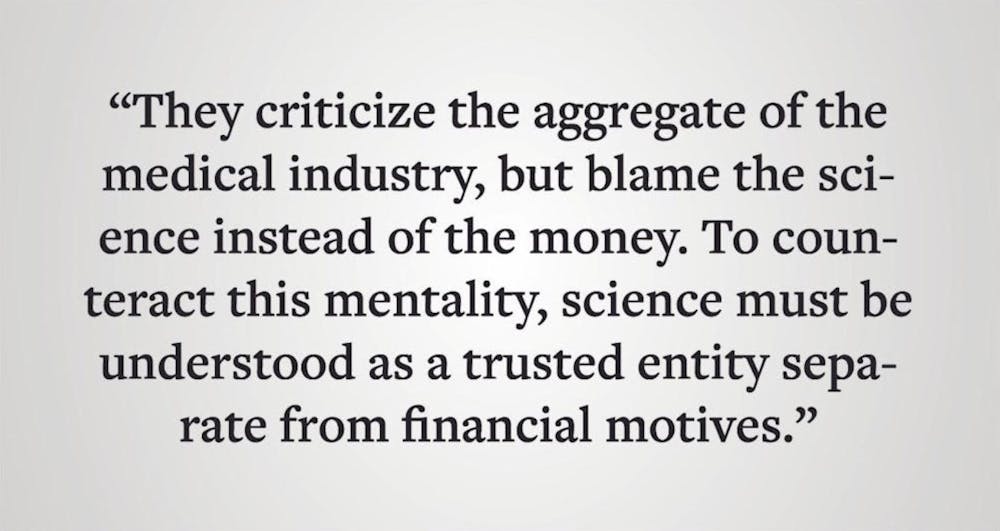Last month, I fell into an odd, but enthralling Instagram Reels rabbithole. I saw homesteaders, trad-wives and podcast bros all encourage their followers to ditch traditional medicine entirely and reject physicians’ advice for their general health. Podcast host and right-wing token Joe Rogan has given this medical misinformation a mainstream platform since the COVID-19 pandemic, when he casted doubt on the safety and necessity of vaccinations.
Rogan — who himself has no medical training or experience — became a figurehead for anti-science rhetoric that has invaded social media platforms. Several hundred doctors publicly denounced Rogan for his reckless and misleading advice, but his following continues to grow. As of March 2024, The Joe Rogan Experience boasted 14.5 million followers on Spotify, classifying him as one of the most influential podcasters in the world. Rogan’s following signifies that these beliefs are not secluded to a niche corner of the internet, but are a widespread concern. As an institution with two health-centered graduate schools and hundreds of students that influence the medical industry, Brown must instate a program to consider and combat such growing medical distrust.
Videos like Rogan’s are often accompanied by passionate and equally skeptical comment sections. For a while, I could feel nothing but frustration and astonishment as I saw users fully abandon any trust in science or logic, placing their faith in random video creators instead of medical experts. But I realized that, to an extent, the origins of this distrust are not nonsensical. There are very real and very consequential issues in our medical industry and healthcare system, and internet conspiracy theorists are quick to point them out. Predatory pharmaceutical companies have created a profit-centered healthcare system characterized by healthcare inequality and shortages of general care physicians, all while prioritizing shareholder returns rather than Americans’ health and well-being.
To most, it is obvious that the U.S. medical system is corrupt, but online medicine-deniers rush to conflate profit motives with the validity of science. It is easy to dismiss anti-medicine beliefs as ignorant, but, ultimately, the medical industry must address its fundamental issues to regain the trust of Americans. Public trust in the healthcare system is slipping, and, as a leader in medical education and an investor in the industry, Brown has a responsibility to train future physicians and medical professionals who will overcome these inadequacies and establish equitable medical practices that prioritize science and health over profit.
The Warren Alpert Medical School and the School of Public Health should instate an integrated program that teaches students to protect the integrity of their practices against profit interests. The practice of medicine is inherently political. Access to health has been and will always be a reflection of social and economic equity — or lack thereof. The study of molecular biology cannot be isolated from its impact on healthcare institutions, and neither can future healthcare leaders and employees. A political and deliberative education is necessary to contextualize the standard medical curriculum. Students must understand the obstacles preventing each American from achieving their health, from sky-high medical costs to the revolving door between private industry and regulatory agencies. Beyond awareness, students have to understand their role in dismantling systemic issues and complying with inequitable practices that arguably violate the hippocratic oath.
This curricular requirement should facilitate conversations about the shortcomings of medicine and healthcare among those who will ultimately become industry leaders. Without this explicit — and possibly uncomfortable — discourse, the growing anti-science movement will continue to reject its authority on the basis of valid allegations of corruption and self-serving corporate leaders.
Americans seek answers for the inadequacies of U.S. healthcare, and skeptics like Rogan provide straightforward — though misinformed — answers. They criticize the aggregate of the medical industry, but blame the science instead of the money. To counteract this mentality, science must be understood as a trusted entity separate from financial motives. It is now the task of academic and medical institutions to send a clear message: The medical community is fighting against dirty money and corporate influence. With a curricular initiative in place, Brown would be able to untangle the muddled relationship between science and profit, and students can propose informed and meaningful solutions to the issues facing American citizens.
CJ Lair ’28 can be reached at craig_lair@brown.edu. Please send responses to this column to letters@browndailyherald.com and other opinions to opinions@browndailyherald.com.

CJ Lair is a staff columnist at the Brown Daily Herald. He is from Gettysburg, Pennsylvania and plans to study Political Science at Brown. This is his first year writing for a publication, and is especially interested in political developments and their impacts on the Brown community.





